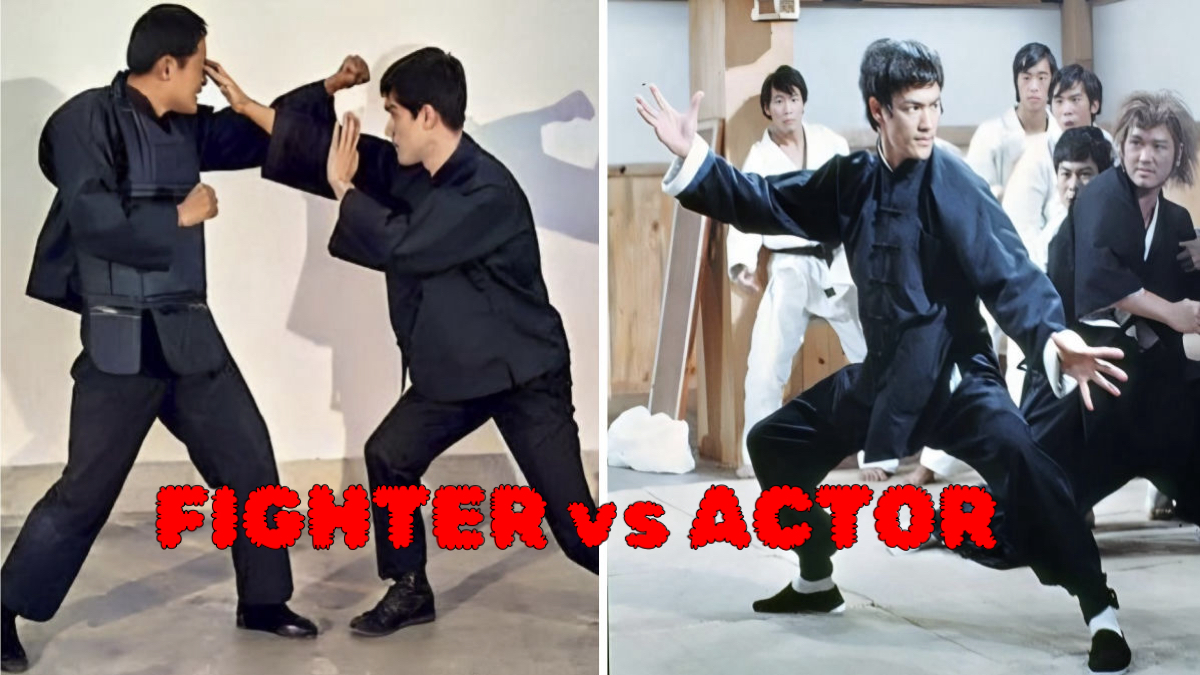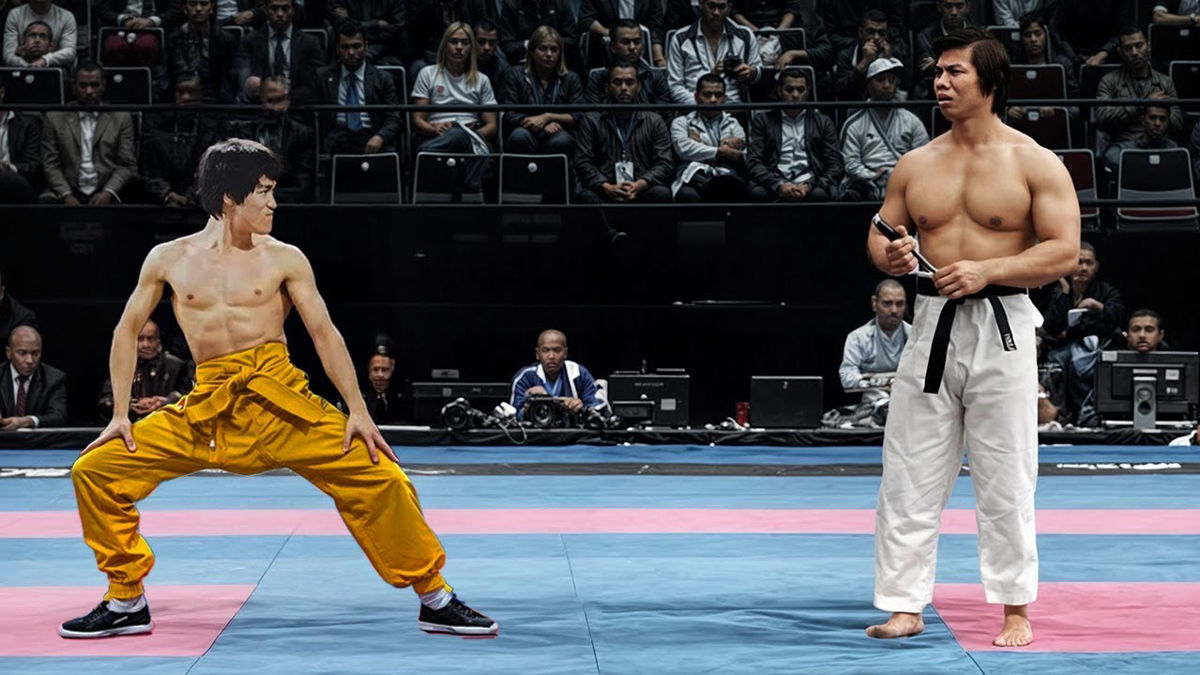
Bruce Lee is often seen as a legend — but was he truly a fighter, or just a movie star with flashy moves? For decades, fans and critics have argued about his real combat abilities. He’s inspired millions through film, but modern MMA fans often question if he could survive a real fight. Was Bruce Lee ever tested in true combat, or did his legend grow mostly through cinema and charisma? Let’s break down the debate from every angle.

The Hollywood Hero vs. the Street Fighter
Bruce Lee rose to fame through his films, which showed incredible speed, power, and precision. But critics often point out that he never fought in professional combat sports like boxing or MMA. While he trained intensely and developed his own style, Jeet Kune Do, some say his fighting was only ever theoretical. Supporters argue that Bruce trained with real fighters and had street fights growing up in Hong Kong. Detractors say anecdotes aren’t proof — they want sanctioned records. This tension between cinematic legend and real-world credentials fuels the debate. The truth may lie somewhere in the middle. He wasn’t a pro fighter, but he wasn’t just a stuntman either.

Bruce Lee’s Training Partners — Who Did He Really Spar With?
Lee trained with martial arts icons like Chuck Norris, Joe Lewis, and Gene LeBell. These weren’t just actors — they were legitimate fighters and champions. Some accounts describe Bruce holding his own, even dominating in sparring. However, none of these encounters were filmed or verified by third-party sources. That leaves room for doubt and speculation. Yet, those who trained with him often describe him as shockingly fast, creative, and adaptable. Their testimonials carry weight — but in today’s world, people want to see footage, not just hear stories. Without visual proof, Bruce’s real abilities will always be partly myth.

The Wong Jack Man Fight — Real Duel or Martial Myth?
The 1964 fight between Bruce Lee and Wong Jack Man is one of the most debated moments in martial arts history. According to Bruce’s camp, he won decisively in just a few minutes. Wong’s side tells a different story — saying the fight was longer, more even, and that Bruce grew tired. No video footage exists, and eyewitness accounts conflict heavily. Still, the fight led Bruce to rethink his approach and streamline Jeet Kune Do. Some say that’s proof it was a tough, humbling experience. Others argue it was simply a turning point in his philosophy. Either way, this mysterious duel is a cornerstone of the Bruce Lee legend.

Could Bruce Lee Survive in Modern MMA?
This is the big question: Could Bruce Lee compete in today’s UFC-style environment? Physically, Bruce was light — around 135 pounds — and would be in the bantamweight division. His speed, movement, and mindset were revolutionary for his time. But critics argue he had no formal ground game or real fight record. Supporters say he would’ve evolved with the times, just like any true martial artist. His focus on efficiency, adaptability, and fitness were ahead of their time. While it’s impossible to prove either side, Bruce’s mindset mirrors what modern MMA now values. In many ways, he laid the philosophical groundwork for the sport.

Did Bruce Lee Ever Really Lose a Fight?
Bruce’s reputation suggests he was unbeatable — but even legends have off days. There are whispers of street fights where he struggled or got caught off guard. But no one has confirmed a legitimate, documented loss in his adult years. His reputation was built partially on mystery, which made him seem larger than life. In a time before camera phones and fight databases, stories could grow quickly. Still, the lack of clear evidence of defeat keeps his myth intact. Some believe even if he did lose, his response and growth afterward are more important. After all, every real fighter learns from failure — even Bruce.

Was Bruce Lee’s Real Legacy His Philosophy, Not His Fights?
Bruce’s impact goes far beyond punches and kicks. His philosophy — be like water, absorb what is useful — revolutionized how people viewed martial arts. He challenged the rigid styles and opened the door for cross-training. In many ways, he was the first to talk about “mixed martial arts” before it existed. For some, this is more valuable than any win-loss record. His ideas shaped the thinking of future champions and teachers alike. So maybe his legacy isn’t about dominance in a ring — but about expanding minds. That may be the most powerful kind of victory.

The Jeet Kune Do Debate — Martial Art or Martial Philosophy?
Jeet Kune Do isn’t a traditional martial art with belts or katas — it’s a personal expression. Bruce rejected rigid systems and wanted fighters to be fluid, adaptable, and direct. Some criticize this as being too vague or lacking structure. Others say that’s exactly the point — real fighting isn’t choreographed. JKD has had both loyal students and sharp critics over the decades. Some MMA coaches borrow from it, while others dismiss it entirely. But few deny its influence on the evolution of modern training. The debate over JKD’s legitimacy continues — just like Bruce’s own legacy.

Why Bruce Lee Still Sparks Debate 50 Years Later
Even half a century after his death, Bruce Lee remains a hot topic in martial arts communities. His charisma, philosophy, and mystery continue to ignite strong opinions. Was he the ultimate martial artist, or a symbol of potential that never got fully tested? The fact that we’re still asking shows his impact hasn’t faded. Every new generation rediscovers him and reopens the same debates. In a world of viral content and fight clips, Bruce’s legend endures without modern proof. Maybe that’s the power of myth — it keeps us questioning. And Bruce Lee, whether fighter or philosopher, still has us talking.

So was Bruce Lee a real fighter or just a cinematic icon? The truth is more complex than either label alone. While he didn’t have a pro fight record, his impact on martial arts is undeniable. He broke boundaries, challenged dogma, and pushed the entire world to think differently about combat. Maybe that’s the fight he truly won — and why he still matters today.







